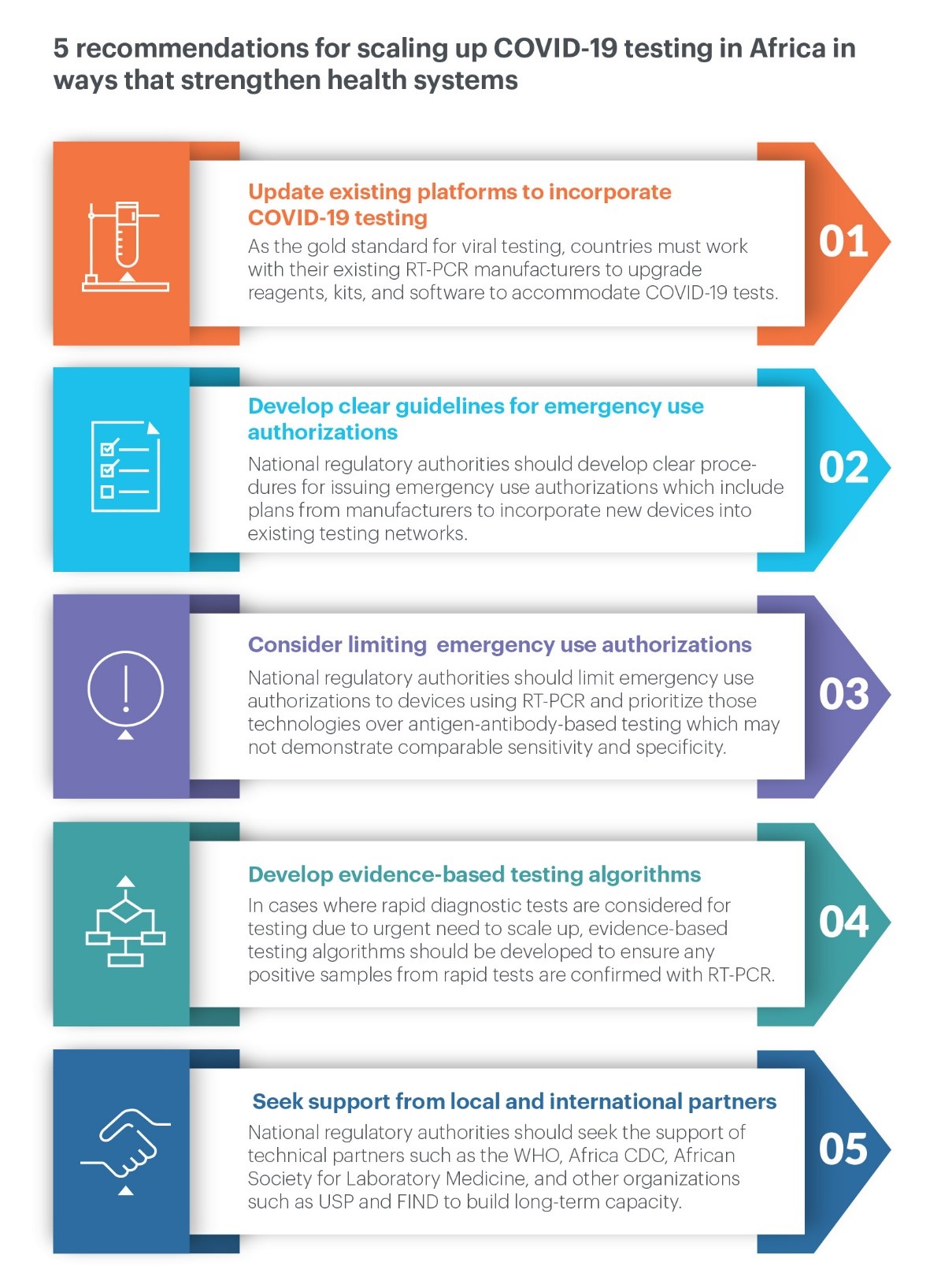
As African nations begin to ease lockdown restrictions, health systems are bracing to prevent the novel coronavirus from spreading rapidly through their populations. Many countries across the continent – such as Ghana, Kenya, Nigeria, Rwanda, South Africa, and Uganda – were ahead of the curve in taking steps to slow the spread of the virus more swiftly than other regions. But as countries reopen, many lack the infrastructure and technical capacity to quickly detect surges in COVID-19, severely hampering their ability to effectively respond. While rapidly scaling up testing across the continent, governments should seize the opportunity to strengthen health systems – in particular, clinical labs – to prepare for future outbreaks.
Building resilient health systems through the COVID-19 response
During the 2014-2016 West Africa Ebola outbreak, there were calls to build up the region’s long-term pandemic preparedness, including strengthening clinical laboratory capacity to prepare for future pandemics. But in the midst of the crisis, affected countries ultimately deployed short-term solutions centered on accelerating scale-up of one-off testing technologies that could only be used for Ebola. The emergency response missed the opportunity to build strong laboratory capacity, which could have enabled more effective control of future disease outbreaks like COVID-19.
In the current pandemic, nations are again at a crossroads in which choices must be made about the best way to expand testing capabilities, which is the first step in the Africa Centres for Disease Control and Prevention (Africa CDC) strategy to test, trace, and treat. With African countries having tested an average of 1,700 people per 1 million as of early June – a far cry from testing rates up to 20-fold higher in high-income countries – governments are racing to procure test kits and are starting to see success due to a new initiative from the Africa CDC. But even with enough test kits, there is insufficient laboratory capacity to process these tests in a timely manner.
In a recent opinion piece in the African Journal of Laboratory Medicine (AJLM), I argued that countries should make a conscious decision to scale up COVID-19 testing in ways that will strengthen health systems to respond to future emergencies rather than setting up a new disease-specific vertical program for COVID-19 (see figure for a full summary of recommendations). There is an opportunity for existing laboratory systems and diagnostic tools that are being used for other viruses – for example, HIV – to be adapted, expanded, and scaled up for COVID-19 testing.
Scaling up the right technologies that ensure safety and foster trust
Progress is already underway. A COVID-19-specific component for lab-based real-time polymerase chain reaction (RT-PCR) tests – which are already in use for HIV and other viruses – has become the standard of diagnosis for COVID-19 throughout the world. To seize the opportunity for sustainable health systems strengthening, prioritizing this technology is paramount, especially given the limited accuracy of alternative technologies such as rapid antibody-antigen-based point-of-care tests.
The quality of test results will be critical to the success of the pandemic response. Regulatory agencies should consider limiting emergency use authorizations that allow new diagnostic technologies on the market without fully vetting their quality. As part of USP’s Technology Review Program, USP expert volunteers are already reviewing new diagnostic technologies for COVID-19. The results of their work will help guide decisionmakers in low- and middle-income countries (LMICs) about each technology’s strengths and weaknesses, informing implementation decisions.

Ensuring accurate results
If data produced by diagnostic tools are not reliable, treatment decisions won’t be either. USP has worked with laboratories in LMICs for over 25 years to help them build quality management systems so that they can generate quality-assured data for decision-making. In partnership with donors like the Global Fund to Fight AIDS, Tuberculosis, and Malaria and USAID, we have worked with more than 90 laboratories in 34 countries in Asia, Central Asia, Africa, Latin America, and the Caribbean, helping achieve ISO certifications for testing and calibration laboratories and medical laboratories, as well as World Health Organization prequalification. For COVID-19 specifically, USP has already helped scale-up testing through existing laboratory networks in Ghana and Nigeria and is forming additional partnerships to contribute to building this capacity.
The unprecedented need to rapidly scale up testing across the African continent presents an opportunity to leave countries’ viral testing arsenals better equipped for future public health emergencies. Countries can and should make a concerted effort to scale up COVID-19 testing in a way that strengthens health systems to respond to emerging pandemics so they are not blindsided in the next response.
Learn about USP’s critical role in the public health response to COVID-19.


